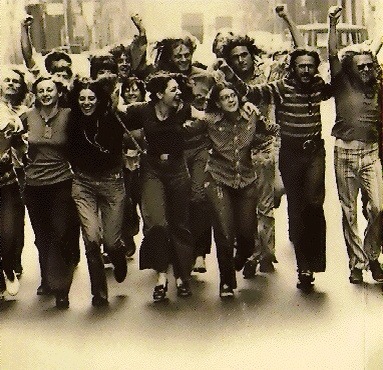
Forty-five years ago today, in a small tavern in New York City, history was made. The Stonewall Riots not only sparked a movement, but changed history and, eventually, helped millions of people embrace their true identity.
In 2014, marriage equality is sweeping the nation, gay men and women can proudly and openly serve their country and we are leading the charge.
There was a time when LGBT people were forced to hide in the shadows, their way of life criminalized – marriage wasn’t even a consideration. Police would raid gay bars (if they weren’t getting paid off by the owners) and arrest people on the spot if they didn’t have identification, or if they were in drag.
But in 1969, came the biggest moment in the history of the LGBT Civil Rights Movement: the Stonewall Riots in New York City.
On Saturday, June 28, police raided the Stonewall Inn in New York City’s Greenwich Village. This was routine at the time, but this raid would be like no other before. As police they were lining bar-goers up for inspection, all hell broke loose.
“When they came in the door, they were pushing and shoving people,” said Tree, a bartender at the Stonewall Inn who was there when the riots happened. “They actually pushed this guy with a mustache — who turned out to be a lesbian with a mustache — and it took two cops to pull her off the cops.
“[Storme DeLarverie, who recently died at 94] was arrested with a few other people, he continued. “When the cops came in, my friends Fred, Charlie and I kicked the plywood wall out this door. There were like 30 of us out here. Within a few hours, it was 3, 4, 500 people. The cops were afraid to leave the building.”
“We broke the window, broke the wall behind the window, we pulled a parking meter out of the ground and used it as a battering ram to knock the doors in,” he said, pointing at the Stonewall’s now open doors, which wafted a bit of air conditioning and bar smell out on Christopher Street. “But when you start a bar on fire — with the police in it — that’s when the riot squad did come. Because we lit the garbage cans on fire and threw them through the windows.”
The riots became national news the next day, and what was just one night of chaos turned into an organized movement with LGBT groups popping up around the city, and soon, around the country.
“To me, Stonewall is an act from people who were tired of being pushed into the shadows of society, taking a stand for their human dignity,” said Susanna Aaron, a volunteer working for Stonewall’s 45th anniversary. “There was a moment of fury which was these riots at this bar but this community turned it into a real political movement with very clear goals.”
Today, when states are reexamining their gay marriage bans (Indiana just overturned theirs on Wednesday), the Stonewall Riots’ significance in the fight toward equality is recognized even more strongly.

Now, after 45 years, 19 states out of the 50 have legal gay marriage — not even half of the U.S. Will it take another 45 years to unify the country? Some think it’ll be five, but for others the completion of gay marriage is not about time, but a question of being vigilant.
For LGBT Americans, the Stonewall Riots began our march toward equality, but 100 years ago today, the world changed. It’s innocence was lost, never to return.

One hundred years ago today in Sarajevo, a Serb nationalist shot to death at point-blank range Archduke Franz Ferdinand, the heir to the throne of the Austro-Hungarian Empire, and his wife Sophie. Their deaths triggered the chain of events that led a month later to the start of World War I — the Great War, a horrifying, bloody four-year conflict that killed some 14 million people, collapsed empires and redrew large parts of the world’s map.
The most fascinating thing to me is that it almost didn’t happen. The main attempt on the archduke’s life had been botched. It wasn’t until a wrong turn on the way to visit the hospital and those injured in the first botched attempt that Gavrilo Princip, the archduke’s killer, walked out of a deli to find the archduke’s retinue stopped in front of the store. He had believed the plan had failed, but took the opportunity to shoot the archduke and his wife. Had the archduke’s car not made a wrong turn, had Princip been delayed in e deli a few more minutes, or had the archduke not been sewn into his uniform (apparently he’d gained a little weight and the sewed on uniform had kept doctors from being able to save him)…the world could have been a vastly different place today.
In Sarajevo, the assassination is being marked with commemorations, concerts and exhibitions. The fault lines of a century ago remain all too real, with the country’s ethnically divided politics still a cauldron of animosities. “Sarajevo is now a symbol of a century of wars in Europe but we are here to talk about peace and reconciliation,” said Joseph Zimet, the head of the organization planning the commemoration.
On the eve of the centennial, Bosnian Serbs unveiled a statue to Princip who is considered a Serbian hero and freedom-fighter. A century after the assassination, the rest of the world would likely consider him — and the underground, radical nationalist network he was operating within — a state-sponsored terrorist. The Austrians back then certainly did, and looked at Belgrade, capital of the young nation of Serbia, as the source of the conspiracy.
What happened next, as Winston Churchill put it, was a “drama never surpassed.” Ferdinand’s death presented leading statesmen in Europe’s great powers both a crisis and an opportunity and led to a dizzying series of diplomatic maneuvers, secret negotiations and political escalations that underlay the explosive opening of World War I. A web of alliances between Europe’s competing empires — a “concert” — led to Russia coming in on the side of the Serbs, Germany countering Russia, and Britain, France and the waning Ottoman Empire also entering the fray.
Sean McMeekin, a professor at Koc University in Istanbul, chronicles the weeks that followed Ferdinand’s murder in “July 1914,” a riveting account published this year of how the war started. McMeekin and a whole tradition of World War I historians argue that even after Ferdinand’s assassination, war was not a fait accompli. Indeed, in Europe and across the pond in the United States, many learning of the archduke’s death were less concerned with the drumbeats of war than the question of Austrian succession.
As we mark the war’s centennial, there will be time yet to explore its legacy and effects. What McMeekin and other historians emphasize, though, was that the war was the creation of a coterie of political elites, each fueled by their own lust for greater power.
No one was guiltless in the build-up. This year, in Britain, there’s already been an animated debate about how to remember World War I. Conservative Education Secretary Michael Gove lambasted “leftist” historians and commentators who cast it as a “misbegotten shambles,” a series of catastrophic mistakes by mustachioed monarchs and cabinet ministers. Instead, Gove argued it was a “just war” against the “ruthless Social Darwinism” of the Germans.
This is a view not shared by many. Germany was punished most in the war’s aftermath, with its Kaiser Wilhelm II — an ambitious expansionist — made out to be the chief villain. But they were hardly alone in their imperial delusions, with the French, the British and most importantly the Russians — whose Czarist leadership still harbored plans to conquer Istanbul, that ancient Rome of the east — all guilty of fanning the flames.
But it’s curious to imagine what would have happened had the archduke survived the assassination. A relative liberal, he had “an almost religious aversion to the idea of war with Serbia,” writes McMeekin, no matter his contempt for the Serbs.
But there were always larger forces in play. An imperialistic arms race in Europe had been building up in the years before. Ethnic nationalism in the margins of fraying empires asked difficult questions of the delicate “concert” of power that was in place on the continent. A reckoning, many argue, was inevitable.
In my opinion the assassination of Franz Ferdinand marks the beginning of the Modern World. We are still dealing with the repercussions of the fall of the Austo-Hungarian and Ottoman Empires. The old imperialistic empires that remained would linger through World War II and be nearly completely gone by the time of the Stonewall Riots in 1969, but we must still deal with the problems of countries that were raped of resources by European (and American) imperialists. The fallout of World War I and the subsequent Paris Peace Conference, particularly the Treaty of Verailles, has had a long lasting effect on the world, and nearly every problem in the world today can be traced back to the events set off by the assassination of Franz Ferdinand.




























